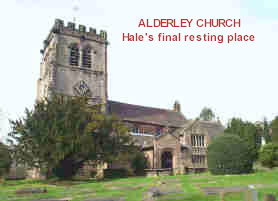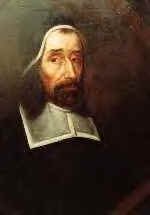1609 - 1676
| |
|
|
Lord
Chief Justice of England, he was born at Alderley in Gloucestershire,
England, on 1st November 1609, the only son of Robert Hale and
Joan Poyntz. Orphaned in
1614, he was placed in the guardianship of an uncle and raised as a strict
Puritan. He
entered Magdalen Hall Oxford in 1626, but chose la In
the early 1640s, he married Anne Moore, the daughter of Sir Henry Moore,
bt. The Moores were staunch Royalists who lived at Fawley in Berkshire. 1652
saw his appointment by Parliament to head a commission whose task it was
to examine and reform the English legal system.
On 30 January 1653, he became a judge in the Court of Common Pleas
and, as such, began to ride the assize circuits dealing, with both civil
and criminal cases. In November 1655 Parliament appointed him to be a member of
the newly formed “Committee on Trade” which was set-up to regulate and
improve commerce. At
the Kent Summer Assize in 1658, Hale presided over the trial of three
“witches” one of whom, Judith Sawkins, was sentenced to death and
hanged. After the death of Oliver Cromwell, he refused to serve as a judge
under his son Richard and he retired into private life until the
Restoration two years later. That same year, as one of the Burgesses for
the University of Oxford, he was elected to serve as a Member of
Parliament, and the following year he wrote A
Discourse Touching Provisions for the Poor (published 1684).
In this he pointed out the defects in the English Poor Law system. Early
in 1660, as a knight of the shire of Gloucester, Hale was returned to
Parliament and, upon the Restoration of King Charles II, he was one of the
thirty-seven judges nominated to try the regicides responsible for the
execution of Charles’ father eleven years earlier. In November that same
year, the King elevated Hale to the rank of Chief Baron of the Exchequer
and he reluctantly accepted the knighthood that accompanied his new
position. Four
years after the trial of Amy and Rose, he tried two more women for the
same crime at Lancaster, one of whom was also executed. Although Hale, who
believed in witchcraft, was responsible for the deaths of at least four
women for that alleged crime, he is known for his religious tolerance and
understanding. He is also
renowned as a kind, human and compassionate jurist who, on one occasion,
only seven months before the trial of the Lowestoft witches, paused and
listened to the pitiful pleas of John Bunyan’s wife for the release of
her husband from Bedford gaol. In
1667, after the Great Fire of London, a Court of Fire Judges was set up
under an Act of Parliament drafted by Hale.
The court’s purpose was to facilitate the rebuilding of the city
and Hale played an important role in this. That year, after his second
marriage, Hale moved to Acton and set up home there.
It was here he met and struck up a long lasting friendship with
Richard Baxter, the outspoken puritan divine and author of Certainty
of the World of Spirits (1691). Four
years later Hale was appointed Lord Chief Justice of the King’s Bench, a
position which he held until February 1676, when he retired due to ill
health. He died peacefully on
Christmas Day that same year and was buried on 4th January 1677
in Alderley churchyard. He
wrote many books and tracts but none were published until after his death.
His writings place him among some the outstanding critical thinkers in the
history of English common law. Hale
is best known for his scholarly works on criminal law, including Pleas
of the Crown (1678) and his History
of the Pleas of the Crown (2 vol., 1736–39) remains an important
work on the common law of criminal offences. His History
of the Common Law of England (1713) was a pioneer work. |
|
 |
|
|---|---|
|
|
|
| Richard Baxter, the puritan divine. A good friend of Sir Matthew Hale and to whom Hale left all his papers and writings when he died. Baxter was a firm believer in the existence of witches and witchcraft, and in his book "The Certainty of the World of Spirits" (1691) he makes specific reference to the trial of the Lowestoft witches. | |
LINKS: http://halefamily.net/sirmat2.html
http://www3.shropshire-cc.gov.uk/baxter.htm
